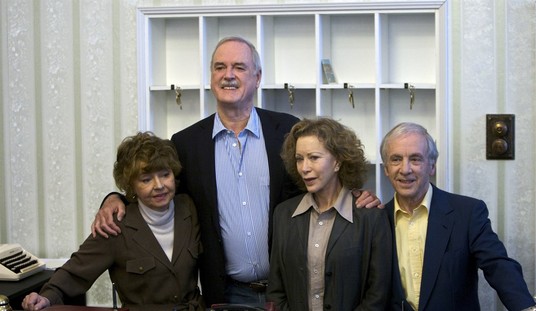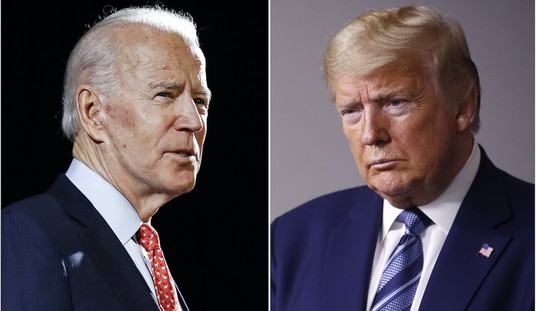History repeats itself, tediously so at times.
The 2014 midterms are providing some clues about what the political topography in 2016 will look like, barring any major events (wars, terrorist attacks, economic catastrophes, etc.) which reshape the landscape in fundamental ways. It is safe to bet that the current Oval Office will, at best, remain as unpopular as he is today. More likely, Barack Obama’s popularity will be even more depressed among the likely presidential electorate.
To the visceral irritation of the nation’s liberal opinion columnists, Obama’s present unpopularity is forcing a number of red and purple state Democrats to run screaming from his record. That condition will only become more pronounced in 2016 when the battlegrounds extend to states with a slightly bluer hue.
For a data-rich analysis of why the in-party has such a difficult time retaining control of the White House after two terms, see Dan McLaughlin’s dissection of post-War elections. A slightly more tangible representation of this phenomenon, recall the great 2008 scramble among Republicans to disassociate from George W. Bush.
It was clear that the Republican brand was in trouble by 2006 when the party lost control of both chambers of Congress, but confirmation that 2008 would also be a disastrous year for the party arrived only after the GOP lost a special House race in May of that year… in Mississippi.
“They are canaries in the coal mine, warning of far greater losses in the fall, if steps are not taken to remedy the current climate,” wrote former Rep. Tom Davis (R-VA), then the head of the National Republican Congressional Committee, in a memo to his nervous members. “The political atmosphere facing House Republicans this November is the worst since Watergate and is far more toxic than it was in 2006.”
Steve Schmidt, Sen. John McCain’s (R-AZ) 2008 campaign manager, was characterized by The New York Times as having said that the GOP’s problems even at the House level “steeled their resolve to run a campaign that distinguished Mr. McCain from both Mr. Bush and the Congress where he has served.”
It should not, however, have taken a special election loss to see that coming. Republican presidential aspirants had been running against George W. Bush as early as 2007.
On the stump, former Massachusetts Gov. Mitt Romney regularly assailed the lack of international leadership under Bush and the “perception that we have not been as open and participative with other nations as is our normal approach.” He later insisted that the administration “underprepared and underplanned” for the Iraq War.
“I certainly would not send him to the United Nations,” former Wisconsin Gov. Tommy Thompson quipped during a 2007 debate when asked what Bush’s post-presidential role should be.
In that debate alone, former Arkansas Gov. Mike Huckabee insisted that Bush had “bungled Katrina.” Former New York City Mayor Rudy Giuliani observed that a Bush-backed immigration reform proposal was a “typical Washington mess.”
“This war was very badly mismanaged for a long time,” went McCain’s contribution to the pile-on. “And Americans have made great sacrifices, some of which were unnecessary because of . . . mismanagement of this conflict.”
In a later GOP debate, moderator Wolf Blitzer even devoted an entire section to teeing up a premise designed to elicit recriminations of the sitting president when he asked participants what Bush’s biggest mistake in office had been.
The rebukes that Bush endured at the hands of members of his own party were as stern as any that were doled out by Democrats, but the 43rd President took his lumps. During that election and for years after words, the former president never said much in his own defense. Every indication suggests that Barack Obama will not follow a similar course.
Obama has frustrated his allies in Congress who are attempting to frame themselves as independent from the White House by assuring jilted liberals that they are being dishonest.
“I am not on the ballot this fall,” Obama insisted last week. “But make no mistake: these policies are on the ballot. Every single one of them.”
The reaction from Democrats, even core supporters like David Axelrod, was to shake their heads in dismay over Obama’s impolitic comment. The president apparently disagreed, because he went ahead and repeated this claim even after he was admonished for it.
“The bottom line is, though, these are all folks who vote with me,” Obama said of embattled Democratic incumbents in a radio interview with MSNBC host Al Sharpton. “So, this isn’t about my feelings being hurt. These are folks who are strong allies and supporters of me. And I tell them, I said, you know what, you do what you need to win.”
Obama’s self-defense certainly thrilled leftwing media outlets which have bristled over the efforts of Senate Democrats to distance themselves from the president, but it can only damage the party’s electoral prospects as red and purple state Democrats do their best to ensure that GOP-leaning voters are not provided with any more reasons to turn out on November 4th than they already have.
Why will this phenomenon persist in 2016? Obama is only likely to grow less popular, prompting those who vying to succeed him to insist as firmly as did GOP hopefuls in 2007 that their presidency will not be Obama’s third term. Furthermore, as The New York Times and others have noted ad infinitum, Barack Obama remains and will remain a popular figure with the members of a core Democratic voting bloc: African-Americans. Democratic candidates running in 2016 will have to perform a delicate balancing act in which they distance themselves from Obama when appealing to the broader electorate while simultaneously embracing Obama while microtargeting black voters.
That is going to be a difficult task, and it will be Obama himself who will likely prove best suited to reach out to minority voters despite his overall unpopularity. This way, Democratic 2016 hopefuls will hope to maintain the plausible fiction that they are disassociated from Obama even while he refutes that assertion in front of select audiences.
So, will this strategy work? It is hard to see how. The technology and fractured media environment which made microtargeting messages to select audiences possible simultaneously made it obsolete; it is impossible to ensure one group of voters is sequestered enough so that they are never exposed to competing and contradictory messages from the same candidate. But Democrats will try – they have no choice.
Even if the in-party might like to see Obama off the stage quietly in 2016, they will probably need him in some capacity. From a Democratic perspective, that is probably for the best. After all, we have no evidence to suggest that Obama would go quietly in the first place.








Join the conversation as a VIP Member